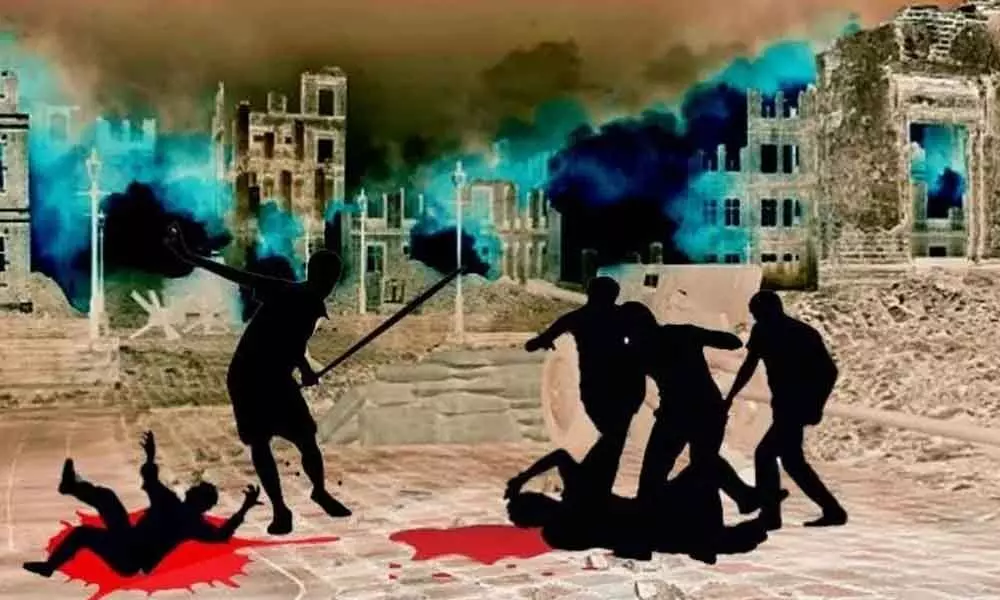Punjab lynching: The silence of political parties is deafening
The killings have attracted the attention of only a small section of intellectuals. They have demanded that the police investigate the lynching
image for illustrative purpose

THOUGH the lynching of an alleged perpetrator of the desecration of Guru Granth Sahib in the Golden Temple of Amritsar made headlines in the media, it could not evoke the required outrage. Soon after it, a similar incident was reported at a Gurudwara in Kapurthala. People are pointing out that incidents of sacrilege increase during the time of elections. The State will go to the polls early next year. Obviously, attempts are being made to divide the people and various means are being adopted for this purpose. Desecration is the surest way of exciting people's sentiments.
In the incident at the Golden Temple, a young boy jumped into the sanctum sanctorum and took up the sword kept before Guru Granth Sahib. The sewadars (religious workers) caught him, and devotees beat him to death. In another incident, devotees beat a person to death in Kapurthala. The victim is supposed to have entered the Gurudwara with the intention of desecrating the religious text. The police, however, say that in the latter incident, the person had entered the Gurudwara with the intention of theft. It is important to note that in both cases, the police were present on the spot.
In the last few years, the State has reported over 300 cases of desecration, and successive chief ministers have promised stringent punishment for perpetrators and to unmask those who are involved in destroying communal harmony. However, people are accusing the government of inaction and alleging that virtually no worthwhile step has been taken to stop incidents of sacrilege. Political parties are trying to outbid each other on the issue. In this competition, they have completely ignored the last two heinous killings. The killings that have brought only infamy to the State did not bother the political class in any manner.
Instead, political parties are vying with each other to score points on the issue. Each of them demands that those responsible for the plot should be punished. In a sense, they are endorsing the killings. Navjot Singh Sidhu, the chief of the State Congress, went far ahead and demanded the hanging of the guilty in full public view.
Is it not an endorsement of lynching? What Sidhu is suggesting has already been implemented by the devotees. Devotees killed the suspects in public view. Since Sidhu heads the ruling party in the State, his statement should worry us more. After all, the party has the responsibility of ensuring a fair trial even in cases where the offense has been committed before the eyes of the public.
Ironically, Sidhu has made this statement in Malerkotla, an erstwhile princely State that is known for its outstanding record of communal amity. The Muslim ruler of the State refused to join Pakistan in 1947 and ensured the safety of his minority Hindu and Sikh subjects. No incidents of violence were reported in this Muslim majority State.
The killings have attracted the attention of only a small section of intellectuals. They have demanded that the police investigate the lynching.
Perhaps India is the only country where religious persecution has never been the norm. Before the advent of the British, we did not hear of communal riots. Lynching is also of very recent origin. Organized attacks were made on minorities by caw-vigilantes. They lynched the victims in cold blood. All but a few condemned the act. Here, the situation is different. Every political party is avoiding criticizing the act.
What lies ahead? In an age of virulent communalism, we can hardly think of an immediate cessation of all these incidents. Both desecration and lynching are the results of hatred spread in the name of religion. Very few can be lured by money to indulge in desecrating other sacred texts or monuments of other faiths. Either he should be mentally insane or so fanatic as to even risk his life in order to denigrate other religions. The violent response is also an outcome of the communally charged atmosphere.
The incident at Kapurthala Gurudwara points to the fact that the person had gone with the intention of theft and was killed in the apprehension of indulging in desecration. The apprehension is a sign of mistrust towards people of other faiths. No one can deny that mistrust between people of different faiths has increased in recent years. In the case of Sikhism, the religion has traveled a long and arduous journey to preserve its recognition of the diversity of faiths. The Guru Granth Sahib is a scripture that accommodates all the streams of thought prevalent during the time.
We have to go a long way to fight religious fanaticism. The western world has succeeded in doing so by adhering to scientific rigor and rationalism. They have strengthened their democratic institutions. They have struggled and made sacrifices to imbibe the creed of liberty, equality, and fraternity.
They do not consider any person above the law. We have seen how people in the USA stood unitedly to get justice for George Floyd, the black victim of police brutality. This is a continuous process. If we want the rule of law to prevail, we must respect the rights of all people, including criminals. People who were apparently guilty of desecrating the Guru Granth Sahib should have been handed over to the police. The police too should have risked their lives to save them, so that they could have received a fair trial.
The All India Congress Committee must take action against Sidhu for his statement because it is against the law.
(Anil Sinha is a senior journalist. He has experience of working with leading newspapers and electronic media including Deccan Herald, Sunday Guardian, Navbharat Times and Dainik Bhaskar. He writes on politics, society, environment and economy)

